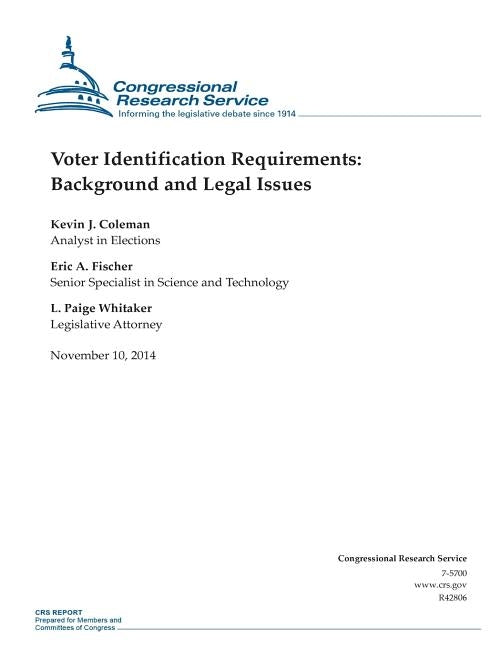1
/
of
1
Congressional Research Service
Voter Identification Requirements: Background and Legal Issues
Voter Identification Requirements: Background and Legal Issues
Regular price
$19.95 USD
Regular price
Sale price
$19.95 USD
Unit price
/
per
Couldn't load pickup availability
Share
Some states require voters at a polling place to produce identification before casting a ballot. Such requirements have emerged as a controversial issue in recent elections, particularly requirements in some states for photographic identification (photo ID), and they are the focus of this report. Since 2008, more than 30 states have enacted laws relating to voter identification, with several containing photo ID requirements. Several states enacted voter identification laws that have either been struck down by courts or are not yet in effect. A number of bills with voter identification provisions have been introduced in the 113th Congress and one (S. 1945) has received committee consideration. Thirty states require voters to provide an accepted identification document when voting in person, although few require such documentation for absentee voters. Eighteen states require photo ID for voting. With respect to what type of photo ID is acceptable and what happens if a voter does not have it, no two states are the same. Nine of the 18 photo ID states require it for polling-place voting but permit alternatives such as signing an affidavit for voters without an ID. Eight states-Georgia, Indiana, Kansas, Mississippi, South Carolina, Tennessee, Texas, and Virginia-permit only voters who present a photo ID to cast a ballot, with few exceptions. Arkansas, Pennsylvania, and Wisconsin enacted similarly stringent photo ID laws that, due to court action, were not in effect for the November 4, 2014, election. Washington conducts its elections by mail, but one in-person vote center is open in each county on Election Day and photo ID is required; thus, it is included among the photo ID states. Leading up to the 2014 midterm election, state voter photo ID laws were challenged under the Fourteenth Amendment to the U.S. Constitution, Section 2 of the Voting Rights Act (VRA), or state constitutional provisions. In some instances, due to ongoing appeals, the question of whether a particular photo ID law would be in effect was resolved only in the final months or weeks preceding the November 4 election. In view of a 2008 U.S. Supreme Court ruling that upheld the constitutionality under the Fourteenth Amendment of a voter photo ID law, such challenges have drawn attention. They are also notable because of their application of Section 2 of the VRA, which has generally been invoked in the context of redistricting plans, at-large elections, and felony disenfranchisement laws. Further litigation in this area is expected, and it is unclear how courts in other jurisdictions or appellate courts will rule. Supporters of photo ID requirements in particular emphasize the need to prevent voter fraud, while opponents emphasize the need to avoid disenfranchising legitimate voters who do not have ready access to a photo ID. Polling data suggest that most voters and most local election officials support a photo ID requirement but that many are also concerned about the risk of disenfranchisement. The policy controversy centers largely on whether the risk of disenfranchisement or the risk of voter fraud is the greater threat to the integrity of the electoral process. This policy debate is being conducted in the absence of a broad consensus about the evidence pertaining to those risks.
Binding Type: Paperback
Author: Congressional Research Service
Published: 11/10/2014
Publisher: Createspace Independent Publishing Platform
ISBN: 9781503272330
Pages: 26
Weight: 0.19lbs
Size: 11.00h x 8.50w x 0.05d
View full details
Binding Type: Paperback
Author: Congressional Research Service
Published: 11/10/2014
Publisher: Createspace Independent Publishing Platform
ISBN: 9781503272330
Pages: 26
Weight: 0.19lbs
Size: 11.00h x 8.50w x 0.05d


